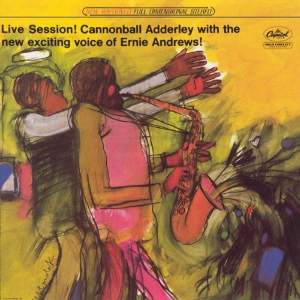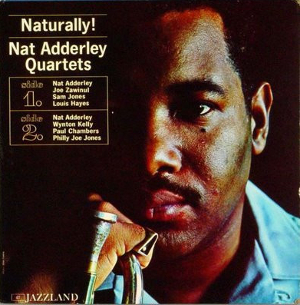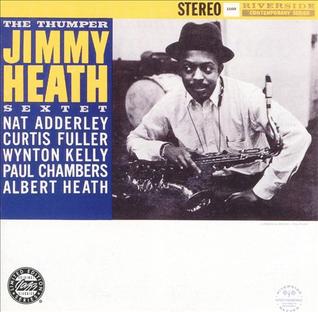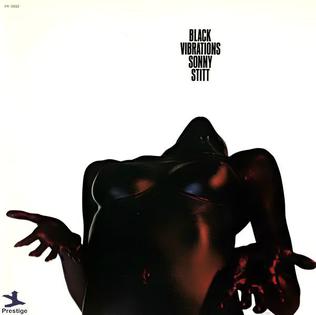
Why Am I Treated So Bad! is a live album by the Cannonball Adderley Quintet, recorded at the Capitol studios in Los Angeles in 1967.

Presenting Cannonball is the 1955 debut album by jazz saxophonist Cannonball Adderley, released on the Savoy label, featuring a quintet with Nat Adderley, Hank Jones, Paul Chambers, and Kenny Clarke. The CD release included bonus tracks of alternate takes of tracks from Adderley's recording debut originally released as Kenny Clarke's Bohemia After Dark (1955).

Julian "Cannonball" Adderley is the second album by jazz saxophonist Cannonball Adderley, and his first released on the EmArcy label, featuring an octet with Nat Adderley, Jerome Richardson, Cecil Payne, John Williams, Paul Chambers, Jimmy Cleveland or J. J. Johnson, and Kenny Clarke or Max Roach arranged by Quincy Jones.

In the Land of Hi-Fi with Julian Cannonball Adderley is the fourth album by jazz saxophonist Cannonball Adderley, and his third released on the EmArcy label, featuring a big band with Nat Adderley, Jerome Richardson, Ernie Royal, Bobby Byrne, Jimmy Cleveland, Danny Bank, Junior Mance, Keter Betts, and Charles "Specs" Wright.

Cannonball Enroute is an album by the jazz saxophonist Cannonball Adderley, released on the Mercury label, featuring performances with Nat Adderley, Junior Mance, Sam Jones, and Jimmy Cobb. The album was recorded in 1957 but would only be released in 1961.

Discoveries is a compilation album by jazz saxophonist Cannonball Adderley released on the Savoy label featuring alternate takes of tracks from Adderley's recording debut originally released as Kenny Clarke's Bohemia After Dark (1955) and his first album Presenting Cannonball Adderley (1955) performed by a quintet with Nat Adderley, Hank Jones, Paul Chambers, and Kenny Clarke and a septet with Donald Byrd and Jerome Richardson added and Horace Silver replacing Jones.

Live Session! is a live album by jazz saxophonist Cannonball Adderley recorded at Memory Lane, Los Angeles in 1962 and the Lighthouse, Hermosa Beach in 1964 and released on the Capitol label featuring performances by Adderley with Nat Adderley, Joe Zawinul, Sam Jones and Louis Hayes and vocalist Ernie Andrews.

The Price You Got to Pay to Be Free is an album by the Cannonball Adderley Quintet recorded, in part, at the 1970 Monterey Jazz Festival. A portion of the performance is memorialized in the Clint Eastwood movie Play Misty For Me. Additional "live in-studio" tracks were recorded the following month at the Capitol Records Tower, in Hollywood, to turn the Monterey material into a double album. The album features Adderley with brother Nat Adderley, Joe Zawinul, Walter Booker and Roy McCurdy and guest appearances by Bob West and Cannon's 15-year-old nephew Nat Adderley, Jr. who penned and performed the gospel-influenced protest title song.

African Waltz is an album by jazz saxophonist Cannonball Adderley, released on the Riverside label and performed by Adderley with an orchestra conducted by Ernie Wilkins. The title track had been a UK hit single for Johnny Dankworth.

The Black Messiah is a live album by jazz saxophonist Cannonball Adderley recorded at The Troubadour in Los Angeles, California in 1971 featuring performances by Adderley's Quintet with Nat Adderley, George Duke, Walter Booker and Roy McCurdy with guest appearances by Airto Moreira, Mike Deasy, Ernie Watts, Alvin Batiste, and Buck Clarke. After many years of being out of print, The Black Messiah was reissued in 2014 by Real Gone Music; the new 2CD reissue included liner notes by music journalist/blogger Bill Kopp.

Introducing Nat Adderley is an album by jazz cornetist Nat Adderley first released on the Wing label featuring performances by Adderley and his brother Julian "Cannonball" Adderley, Horace Silver, Paul Chambers, and Roy Haynes. The album was later released on the Emarcy label and also rereleased on the Limelight label as Them Adderleys

Naturally! is an album by jazz cornetist Nat Adderley released on the Jazzland label featuring performances by Adderley with two separate groups, the first featuring Joe Zawinul, Sam Jones, and Louis Hayes, and the second with Wynton Kelly, Paul Chambers, and Philly Joe Jones.

Calling Out Loud is an album by jazz cornetist Nat Adderley released on the CTI label featuring performances by Adderley with Jerome Richardson, Joe Zawinul, Ron Carter, and Leo Morris and with brass and woodwinds arranged and conducted by Bill Fischer.

Big Bags is an album by vibraphonist Milt Jackson featuring big band performances arranged by Tadd Dameron and Ernie Wilkins recorded in 1962 and released on the Riverside label.

The Soul Society is the debut album by bassist and cellist Sam Jones featuring performances recorded in early 1960 and originally released on the Riverside label.

The Thumper is the debut album by saxophonist Jimmy Heath featuring performances recorded in 1959 originally released on the Riverside label.

Black Vibrations is an album by saxophonist Sonny Stitt recorded in 1971 and released on the Prestige label.

The Exciting New Organ of Don Patterson is the debut album by organist Don Patterson recorded in 1964 and released on the Prestige label.

Patterson's People is an album by organist Don Patterson recorded in 1964 and released on the Prestige label.

Satisfaction! is an album by organist Don Patterson recorded in 1965 and released on the Prestige label.























